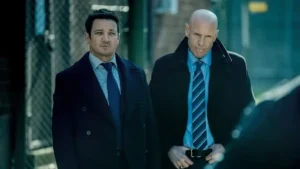Summary
I’m Thinking of Ending Things, or as I have named it The Kaufman Experience, is a masterclass in surrealist filmmaking.
This review of I’m Thinking of Ending Things (Netflix) is spoiler-free.
There “ain’t” no yellow brick road running through Glasgow Spoilerville, is probably what anyone is thinking after watching a Charlie Kaufman film; however, you just can’t stop talking about it. I mean, how can you possibly spoil something you don’t understand that is open to so many interpretations? A young woman has the same issue. I mean, she never stops talking about what she doesn’t understand and why something feels off. So much so, she keeps muttering to herself that she wants to end things, but doesn’t quite know why. She then repeats it so much that her boyfriend, Jake, he keeps thinking she said something and denies it. She is quiet, withdrawn, seems depressed, but it doesn’t seem like anything Patsy Klein can fix in a film that feels like such an odd-duck of a dream — a feel of a Mulholland Drive with a Kaufmanesque touch.
There is something seriously off about their relationship. Sure, the Young Woman (Wild Rose’s Jessie Buckley) thinks Jake (Jesse Plemons) is nice, sweet, sensitive, smart, and unlike most men, he listens intently (what a pig), but something’s so off she can’t possibly put it into words… and she’s a poet or an artist or physicist, who knows really. She is about to meet the parents and find out why things feel off with Jake. His mother (the great Toni Collette) is the nervous type that laughs at stressful situations and has the endearing habit of mispronouncing at least one word every time she talks. His father (David Thewlis) interrupts often and seems inebriated, frankly. However, he can spot a plot flaw in a story from a mile away.
Like his most classic films, Kaufman’s script in I’m Thinking of Ending Things makes you question what is real and what is not. What does the young woman’s existence mean to the world she is in, to Jake, and to his parents? Conversely, what does the young woman and Jake’s coupling mean to the world they are currently living in? He does all this as if the characters are stuck inside a snow globe, and you shake up time, cause, and effect with all the possibilities that can come from it— the rest is left up to your own interpretation.
Furthermore, he has taken over being the master of juxtaposition, since Tim Burton abandoned the title years ago. He is so good at it here and he places so many eye-catching moments and figures everywhere (just go with me here) that there are contrasts and comparisons of greater happenings right in front of the viewer. We don’t realize what’s unfolding; there are too many Easter eggs to count and it’s impossible to spot them all, which demands repeated viewing.
Kaufman’s script for I’m Thinking of Ending Things is based on the Shirley Jackson Award-nominated horror thriller by Iain Reid of the same name. The first third of the film is very funny without being outlandish and has such expertly timed delivery that it doubles with rich insight into the film’s story and characters. For instance, after telling a long story of how the young woman and Jake met, the young woman says, “God, it feels like six weeks ago; even longer.” The film then parallels, while not as horror-centric as Reid’s well-crafted tale, as a psychological nightmare that feels unsettling. Finally, the pairing with Kaufman’s vision captures multiple interpretations, something the book is praised for, and for me, seems to be one obvious choice. Many may not agree with me. Others may have their own spin, which is what makes this adaption so brilliant.
If you thought or had been afraid Buckley was a one-trick pony, let me put your fears to rest. She is a major talent. The film rests on her shoulders to take you through what I’m interpreting as Robert Plutchik’s pairing of eight primary emotions: joy-sadness, anger-fear, trust-distrust, surprise-anticipation (You see? Even Buckley’s performance is layered with juxtaposition). Collette’s part is perfect for her and has great meaning, but I would like to point out the invaluable and underappreciated Jesse Plemons. His Jake is the young woman’s emotional straight man, and his part is played with such selfless representation that when he shows any emotion it’s delivered with a surprising intensity (anger-fear). It’s the kind of role you won’t realize how important it was until you watch the movie again. His scene to close the movie may have you scratching your head, but it’s a haunting one.
I’m being intentionally vague here to not give away spoilers, and I would like anyone who watches Charlie Kaufman’s I’m Thinking of Ending Things to have their own mind open to their own theories. His film touches on themes that are most important to us and the regret of what we take for granted. The film has a delicate psychological balance that gives it a haunting edge. His adaption of Iain Reid’s is a love letter to his very own interpretation of Reid’s work, equipped with tense motifs and a dream ballet. It’s an exercise in (insert your own theory here) and is a masterclass in modern surrealist filmmaking.



